What Maisie Knew Blu-ray Movie
HomeWhat Maisie Knew Blu-ray Movie 
Blu-ray + DVDMillennium Media | 2012 | 99 min | Rated R | Aug 13, 2013
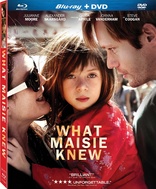
Movie rating
7.4 | / 10 |
Blu-ray rating
| Users | 0.0 | |
| Reviewer | 4.0 | |
| Overall | 4.0 |
Overview
What Maisie Knew (2012)
Six-year-old Maisie is caught in the crossfire of her parent's tumultuous divorce and is presently being used as a tool for manipulation by each of the two parties. Finding new partners shortly after the break-up, both parents are self-absorbed and neglectful in their treatment of Maisie, and soon she realises that if she is going to lead a happy life it won't be from her mother and father's doing...
Starring: Julianne Moore, Steve Coogan, Alexander Skarsgård, Joanna Vanderham, Onata AprileDirector: David Siegel (III)
| Drama | 100% |
Specifications
Video
Video codec: MPEG-4 AVC
Video resolution: 1080p
Aspect ratio: 2.40:1
Original aspect ratio: 2.39:1
Audio
English: Dolby TrueHD 5.1 (48kHz, 16-bit)
English: Dolby Digital 2.0
Subtitles
English SDH, Spanish
Discs
25GB Blu-ray Disc
Two-disc set (1 BD, 1 DVD)
DVD copy
Packaging
Slipcover in original pressing
Playback
Region A (C untested)
Review
Rating summary
| Movie | 4.5 | |
| Video | 4.5 | |
| Audio | 4.5 | |
| Extras | 1.5 | |
| Overall | 4.0 |
What Maisie Knew Blu-ray Movie Review
A thematically difficult films earns top-notch video and audio presentations.
Reviewed by Martin Liebman August 12, 2013You don't deserve her.
It's difficult to gather emotions into words after watching a movie like What Maisie Knew. Feelings of disgust, anger, frustration, and even
fear
cloud every scene like an impenetrable layer of the worst humanity has to offer. The movie doesn't so much look into it, though. Rather, it gazes
out
of it, and from the viewpoint of a child, no less. That unique perspective only enhances the feeling in unease that permeates the film and shapes it
into an uncomfortable but unique and impossibly difficult picture about the ugly realities of a worst-case-scenario divorce in which a child finds
herself a
chess piece in a game in which the parents wound one another without care for Maisie's well being. What's worse are all the phony character
emotions
that are only meant to
further Maisie's positioning on the board, not create a true, loving environment for a child who desperately needs one, even if that environment is
spread between two households. As the parents attempt to lay on
the loving words that seem to come from hate and spite for one another rather than from the heart and soul for the child, little Maisie's life becomes
more uncertain but, at the same time, her
understanding of just how terrible are the truths of her reality comes into focus. It's a heartbreaking movie that's hard to watch but so well done
that it's
impossible to turn away.
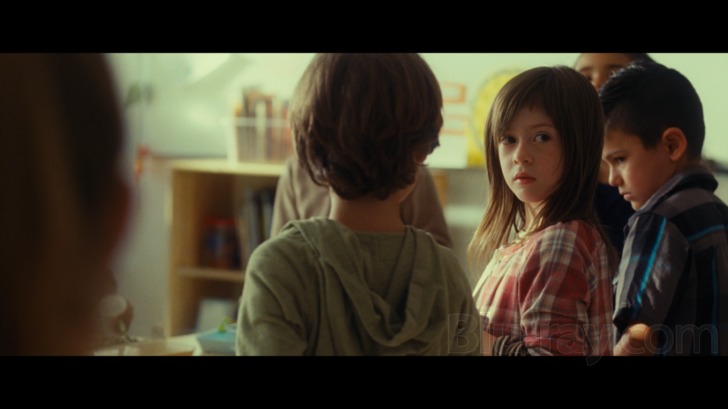
Everything's changing.
Aging Rock star Susanna (Julianne Moore) and her workaholic husband Beale (Steve Coogan) are divorcing. Their daughter Maisie (Onata Aprile) finds herself in the middle of their hostility. Though both show her outward affection, the court rules that Beale should gain custody of the girl. Susanna isn't happy. She battles Beale every way she can, using Maisie as a tool in that verbal war of words and as a prop to gain leverage against him. He does the same with Maisie against Susanna. Soon after the divorce, Beale marries Maisie's babysitter, Margo (Joanna Vanderham), in a rather large ceremony in which Maisie is the flower girl, while Susanna weds a man named Lincoln (Alexander Skarsgård) in a low-key ceremony that does not include Maisie. The child slowly comes to to understand the truth behind her parents' hostility as she observes their behaviors with her, with one another, and with their new loves.
Many of the most powerful moments in What Maisie Knew come when the camera lingers on the title character while her screaming, inattentive, or otherwise chaotic or preoccupied parents battle within earshot, her mind attempting to resolve what's happening, why, and what it means not only for her but her mother and father and, indeed, the entire world she calls "home." Onata Aprile handles these scenes with a startling awareness and understanding of the picture's themes and what it is her character is meant to be experiencing. She conveys more in a look than most films do with pages upon pages of dialogue. Her inward reflections tell a deeper, more heart-wrenching story than any of the film's powerful and emotionally draining outward moments of battle or those many scenes in which Maisie only seems to be in the way of the adult problems and, in essence, becomes the proverbial hot potato passed off to someone else so two parents who probably never should have even conceived a child can live the lives they want to live, not the lives they need to live. Maisie's perspective paints the realities of divorce on a young child in a shockingly new light. The film understands its subject all too well and, while Maisie's circumstances may be extraordinary even in a world plagued by parental separation, it depicts the sort of hurt and turmoil that only forms when love breaks and a child is left in a broken home.
The film explores the ramifications of family building on people not ready to accept the responsibilities of parenthood or, even worse, who fall out of love or were never in love to begin with. To say it's not a pretty picture would be a gross understatement. Clearly Maisie's father is married to his work, not his wife, and she's married to her Rock 'N' Roll career, not her husband. They both make cursory, heartless efforts to connect with their daughter after the divorce that slowly prove to Maisie that it's all empty talk rather than meaningful dialogue. Perhaps she doesn't understand it all on an intimate, inward level, but she grows to realize that her parents in no way have her interests at heart. The film makes it all painfully obvious, sometimes going to extremes to make a point -- Maisie, in one particularly difficult sequence, awakens in a strange place because she's been passed from person to person until she's left with a stranger because nobody can be bothered to care for her -- but it's uncomfortably effective at showing the real trauma, the heartache, and the burden a child of divorce bears, particularly when she finds more love in the arms of people who are not her biological parents.
The cast is fantastic; Aprile's performance is the best of the bunch, but the remainder of the primaries also capitalize on the film's emotional curves of highs and lows that drift from character to character but always intersect, somehow, with Maisie. Alexander Skarsgård and Joanna Vanderham are fantastic as the stepparents who slowly become greater figures in Maisie's life than even her biological parents. Likewise, Steve Coogan delivers a fine effort as a man detached from every part of his world that doesn't come to him through the speaker of his cell phone or the inside of his office. Julianne Moore is oddly cast but at the same time oddly effective as an aging Rocker. No matter how much makeup they slather on her or how many tattoos they draw on her skin, she never can sell that aspect of the part all that well. Where she does excel, however, is in her ability to blatantly lie to her daughter about her feelings. It's not that she doesn't somewhere, deep down, really love her daughter, but Moore's Susanna feels the need to reminder herself of that love rather than come by it naturally. Nevertheless, one cannot help but believe the character would rather be rid of Maisie rather than have her around, despite her efforts to the contrary. Moore sells that notion wonderfully, and she's at her uncomfortable best when slinging curses at her adversaries and turning around only to smother Maisie in kind words and affection, of which some small percent seems genuine and a much greater percent seems to be an act.
What Maisie Knew Blu-ray Movie, Video Quality 
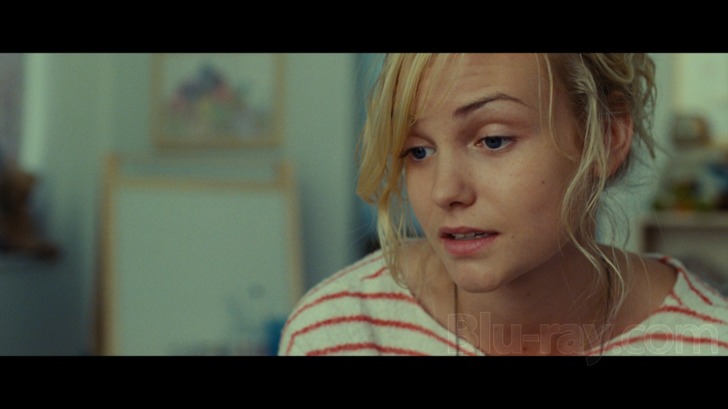
What Maisie Knew looks fantastic on Blu-ray. Aside from some very small, very briefly appearing white speckles in the early parts of the film, the transfer appears virtually flawless. This is a very strong film-like image. A light layer of grain stays with the image throughout, accentuating both the positive details and excellent natural clarity. Facial and clothing lines are film pure and crisply reproduced. Whether imitate close-ups or distant reflective shots that often show Maisie contemplating her situation, the image retains fine clarity and definition throughout. City, country, or beachside locations all showcase the same level of quality definition and attention to detail. Colors are bold and even but not overpowering. There's a nice, natural variety of shades scattered throughout the picture. Everything from bright red clothes to urban grays look fantastic. Black levels are solid and flesh tones are true. This is a good-looking image from start to finish.
What Maisie Knew Blu-ray Movie, Audio Quality 
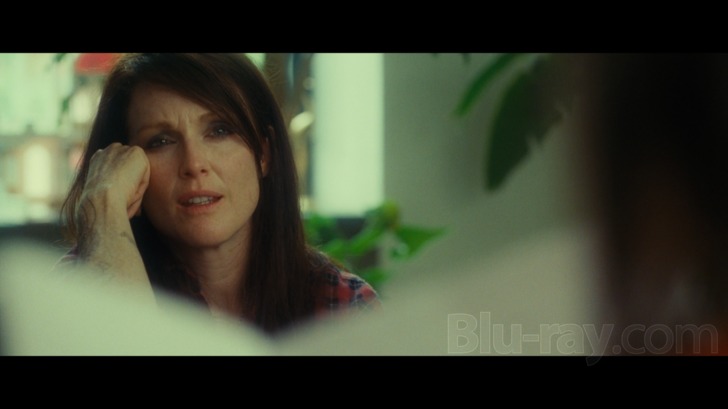
What Maisie Knew features a strong Dolby TrueHD 5.1 lossless soundtrack. There's not a whole lot happening, but when necessary Millennium's soundtrack carries the elements without flaw. As with every high end lossless soundtrack, musical definition is excellent, enjoying natural, wide front end spacing and light surround support. Various sound effects, too, come through with startlingly real presence and authority. Everything from the sound of someone beating on a closed door to honking horns in the middle of the street are so well delivered that the audience will believe they're in the middle of these places and experiencing these effects. Light ambient support also aids the track's authenticity, delivering natural environmental effects on city streets, inside a higher class bar, and elsewhere. Dialogue remains focused in the center and plays with effortless clarity.
What Maisie Knew Blu-ray Movie, Special Features and Extras 
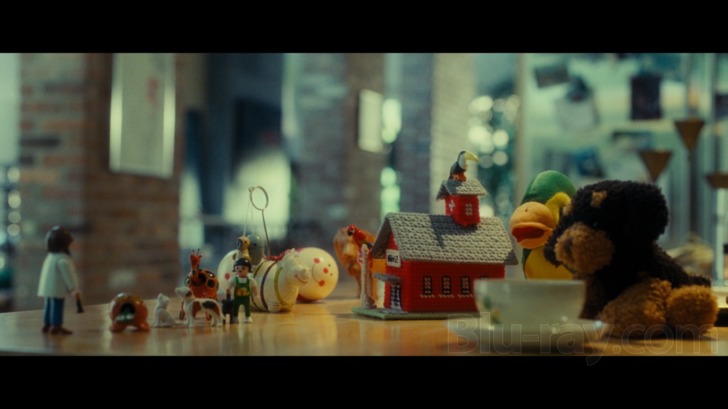
What Maisie Knew contains a commentary track and deleted scenes.
- Audio Commentary: Directors David Siegel and Scott McGehee cover a wide range of topics, including piecing the film together and establishing characters and their arcs, the cast and the elements that drew them to the project, the picture's challenging story and themes, the film's music, shooting locations, and plenty more. They share anecdotes from the set and explore both the basics as well as going deeper into the film. Fans will enjoy this track.
- Deleted Scenes (HD, 7:20): Locksmith, Photo Shoot, Run Out and Holly, and Susanna Music Video.
- Previews: Additional Millennium Entertainment titles.
What Maisie Knew Blu-ray Movie, Overall Score and Recommendation 
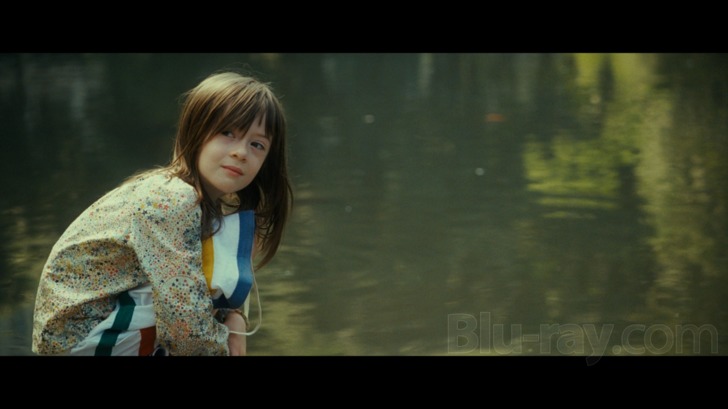
There's a good bit that happens in What Maisie Knew that's not fit to publish in a capsule review for the dangers of spoiling not necessarily events, but the meaning behind them. Safe to say, however, that the one overreaching theme seems to be that with hate comes bondage and with love comes freedom. It's a very tastefully done movie, even if it's sometimes nearly impossible to watch for its language and themes, if only because it's so effective at making the parents such despicable characters full of false pretenses and full of themselves rather than real love for one another, let alone their daughter. It's certainly a movie worth seeing, and particularly so for anyone with any doubts about their ability to properly raise a child in a home built on love. Millennium's Blu-ray release of What Maisie Knew delivers excellent video and audio. Supplements are a bit short, but welcome. Highly recommended.
Similar titles
Similar titles you might also like

The Squid and the Whale
2005

The Other Woman
Love and Other Impossible Pursuits
2009

People Like Us
2012

Solitary Man
2009

The Meddler
2015

Honey Boy
2019

2 Days in New York
2012

The Glass Castle
2017

The Skeleton Twins
2013

20th Century Women
2016

The Savages
2007

Affliction
1997

Divine Secrets of the Ya-Ya Sisterhood
2002

Touchy Feely
2013

Crooklyn
1994

Shame
2011

Armageddon Time
2022

The Private Lives of Pippa Lee
2009

Closet Monster
2015

Wonder Wheel
2017
